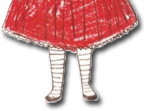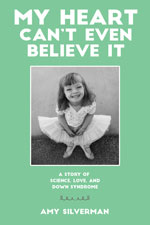
The R-Word 101
posted Tuesday August 21st, 2012
I’m accustomed to correcting grammar and fixing mistakes as I read aloud — Junie B. Jones taught me well — but I admit I stumbled over Chapter 13 in Because of Winn-Dixie, the book Sophie’s been reading for class. I didn’t expect to encounter the word “retarded” in my kid’s school assignment. Why is this word following me around? I thought, exhausted, as I hauled out the laptop and turned it on, ready to email the teacher.
Here’s what I wrote:
Tonight Sophie and I read Chapter 13 together — actually, I began by reading it aloud. I was glad I did because I noticed the word “retarded” is used a couple times. I have real issues with that word, as you might imagine, but as a journalist by training I am also not at all in favor of censorship — particularly of books! (Although to be totally honest, I do ask people to consider not using the word “retarded” when I hear it in public or see it on Facebook — which happens a lot) but i’m curious: How do you and the [fourth grade] team handle it when the word comes up in class, if it does, in the context of discussing the book? I don’t know if Sophie knows the word or if she’d ask about it; probably not. But I’m guessing some kids in 4th grade do.
I hope that question isn’t too much — curious to hear what you think!
And then I held my breath. I didn’t have to wait for long, she wrote back immediately. And I couldn’t have hoped for — or written — such a wonderful response. I only wish this woman had been my fourth grade teacher. (I’m so glad Annabelle had her!) I think this response should be required reading for all of us:
As you know, now that we are entering the realm of big kid books and all of their glory, we will come across a few words that we would never utter and definitely find offensive. There will be many a discussion this year about words that authors feel they need to include, how the characters react, how we feel about them, and how they are treated in our society. Each year we encounter the “r-word” and I am kind of bummed that it is in Winn Dixie right off the bat. Last year we [read] a terrific book called Out of My Mind about a 5th grader with CP who is brilliant, but cannot communicate until she receives a device when she’s about 10. She leaves behind the Special Education classroom and heads off to a traditional 5th grade class. She gives us a personal glimpse of just how painful that word is and the way it makes her feel. We’ll read that one soon, too bad it’s not before Winn Dixie.
I am totally open to your suggestions…but here is how I have traditionally handled it. I talk about how words can change meaning throughout time based on how it’s used. I tell them about my parents’ friend Gay {last name] and my former [co-worker] Linda Gay [last name] and how the word gay has gone from being a word that meant happy and was acceptable in names, literature, and daily use. In more recent years, some people use the word as a derogatory name and to pick on others. Then I talk about the r-word…in the book. I talk about flame retardant pajamas and how retardant means to slow down to give them a round-about definition. Typically I avoid saying that it was a word used to describe people with a cognitive disability. I share that some people, kids and grownups, without seeming to find offense with it, call friends and others the r-word or say they are so r-ted. I talk about how this truly is a hateful word and is just as bad a word as they can imagine and that we need to tell people when we hear them say it that it’s not OK to say. I also tell them that if they hear anyone use it at school, it is a super bad word and they need to tell a teacher. (Side Note: Usually I don’t give a consequence the first time if they were not part of this conversation but use it as an opportunity to have this talk.)
That’s pretty much how I’ve discussed it in the past. Not too much opportunity for them to share because I don’t want them to tell me where they’ve heard it, that’s too sad.
Pretty awesome, huh? And now I’m dying to read the book she mentioned, Out of My Mind.







Two great emails in one week from key adults at Sophie’s school. I’m super impressed. : )
I’ve read “Out of My Mind” – good little book! I can’t remember if I read it on my Kindle or if I have a hard copy. I’ll figure that out, though, and if I have a hard copy of it, I’ll bring it to you on Friday morning!
Figured it out. Read it on my Kindle. Worth reading, though, if you get the chance!
We might just move to AZ so we can get that teacher too. I just met my girl’s pre-school teacher 20 min ago & I left the school nearly in tears – language/ASL issues, not because she was terrible. Well, she was seriously tat’d up and about 12 years old (Tatted? tarted? both apply.) but I shouldn’t judge appearances, right? Though I don’t remember ever seeing a tramp stamp on any of my teachers. *sigh*
This is your life, now. Forever.
It’s so gay.
R
Totally going to find that book. I’m thrilled that the response was so thoughtful and came so quickly. That seems to signfy that it is her way and not just her trying to passify a parent. Good for you for asking the question.
I am a third grade teacher, and reading Winn Dixie to my students for the first time this year. Thank you for this post! It has been tearing me apart knowing that I have to read this word aloud to my class this week. I plan to skip over the word and not read it out loud. Then explain the severity of this word. I have niece with Down syndrome and it breaks my heart that this word is still able to be printed in books and sang in songs. Every year I make a pact with my students to “spears the word to end the r-word.”
http://www.r-word.org/mobile/default.aspx
I explain to my students that word that is offensive to many people and if they hear firiends or adults using it they should tell them not to!
Thank you for the post and I am happy to hear how great your child’s teacher is!